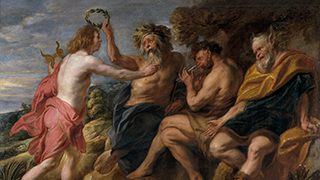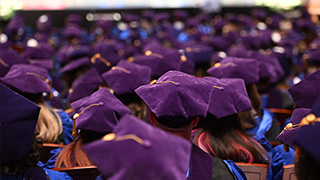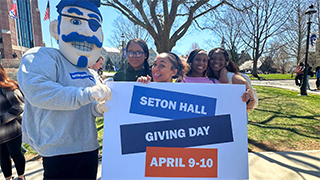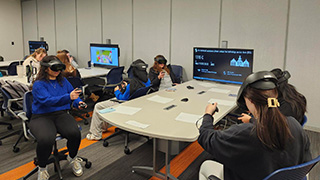Institute for Communication and Religion: Fall 2024 Semester Review
Monday, January 6, 2025

Apollo as Victor over Pan, Jacob Jordaens, 1637.
The Institute for Communication and Religion (ICR) wrapped up an eventful Fall 2024 semester. From new member additions to events and published works, the semester has been marked by milestones that showcase the Institute’s commitment to fostering dialogue and promoting understanding in communication and religious studies.
Steering Committee Updates
To organize Seton Hall’s leadership in ecumenical and interfaith communication, the
ICR steering committee features a dozen members from across the University. The team
welcomed three new members this semester: Father Gerry Buonopane, Axel Takacs, Ph.D.,
and Elizabeth Turello.
Father Gerald Buonopane is the University’s vice provost for academics and Catholic identity. He recently secured three years of pilot funding for a partnership between the ICR and Interreligious Studies Media, a scholarly non-profit organization.
Axel Takacs, Ph.D., studies comparative theology, interreligious studies and Islamic intellectual traditions. He is an assistant professor in the Department of Religion, as well as the editor-in-chief of the Journal of Interreligious Studies. The ICR’s Inter-Sections podcast series features top JIRS authors explaining their research.
The most recent addition is student member Elizabeth Turello, an English major pursuing her M.A. in English with a concentration in literature. Student membership on the steering committee is an important new initiative connecting the ICR with the next generation of religious communication scholars.
Scholarship
The semester kicked off with the ICR’s first sponsored publication. Proceedings from
"Inciting Peace from the Inside Out," a conference hosted at Seton Hall University in Spring 2023, share a range of scholarship
reflecting on spirituality, religion and social conflict. Edited by ICR Director Jon Radwan, Ph.D., the proceedings are available through Seton Hall’s digital repository.
Communication and English alumna Ellen Paul published her thesis “Catholics and Latter-day Saints: A History and a Coming Together” in the Journal of Dialogic Ethics. Her article, developed in collaboration with Radwan, discusses communication and the relationship between Catholics and Latter-Day Saints. It covers historical context and details a recent meeting designed to build a closer ecumenical relationship between the two groups.
ICR Steering Committee member and Associate Professor of Communication Ruth Tsuria, Ph.D., recently had her new book, Keeping Women in Their Digital Place: The Maintenance of Jewish Gender Norms Online, reviewed in the Journal of the American Academy of Religion, a journal that publishes works discussing world religions and their traditions. Pre- and post-publication peer feedback is an essential part of scholarship, and the JAAR review places Tsuria’s work within the top tier of digital religion research.
ICR Podcasting Network
This semester, the ICR released several new podcasts. CORECast, a series supporting
the University’s Core curriculum, released the first episode of Season two. “Thomas Merton’s Learning to Live,” features host Bernie Wagenblast bringing student Ashlyn James and Chad Thralls, Ph.D., together to discuss Merton’s work on spirituality. Read more about it here.
In addition, a pod/videocast covering “Pope Francis’ Letter ‘On the Role of Literature in Formation’” featuring Radwan, Eric Johnston, Ph.D., and Nancy Enright, Ph.D., addressed the Pope’s recent letter. As literature has a strong connection to personhood, faith and culture, the discussion focused on how it needs to be approached as an essential academic subject, not sidelined as optional entertainment.

Taj Lanier, Seton Hall student and Athlete
In November, Radwan and steering committee member Gloria Thurmond, D. Min., opened Seton Hall’s Contemplative Community Week with “Contemplating Beauty in Music: Listening with Pan and Apollo.” A reading and interpretation of Ovid’s myth on musical competition informed guided listening sessions demonstrating how to recognize and appreciate spiritual value and beauty in diverse styles of music. Communication major Taj Lanier, who attended the event, shared that the session “provided me an in-depth chance to reflect on how music conveys both opposing ideals of beauty: the rational and ordered Apollonian and the instinctive and untamed Panian. These frameworks expanded my knowledge of music's transforming power, demonstrating how it nourishes both the conscious mind and the unconscious spirit while encouraging active relational interaction between organized harmony and raw creativity.”
Most recently, Radwan presented “Contact and Rhetoric in Deus Caritas Est” to the University’s Scholars’ Series in the Catholic Intellectual Tradition. He explained how Benedict XVI’s work helped him develop a Christian theory of communication that centers interpersonal touch to counter-balance discursive approaches to ethics and rhetoric.
Upcoming Events
The ICR is also hard at work planning for the future. Next year, the Institute will
submit a grant proposal aiming to fund “Violins of Hope,” a holocaust remembrance
concert using authentic concentration camp violins to develop a “sacred texture” theme.
ICR Director Radwan explained, “Studying the holocaust reminds us how tragically hard
human hearts can become; yet in the midst of genocide many musicians played on, sharing
humane feelings affirming dignity and meaning. Listening to these violins today, our
hearts resonate at that same caring frequency and the indomitable strength and depth
of the human spirit is felt.”
About the Institute for Communication and Religion
Launched in Fall 2017, the Institute for Communication and Religion within the College of Human Development, Culture, and Media provides a nexus for ongoing scholarly exploration of communication topics critically
important to religion and society. Guided by the spirit of ecumenical and interreligious
cooperation, the Institute seeks to engage in public dialogue and debate, promote
academic inquiry and support the religious dimension of creativity — all while upholding
the values of servant leadership, curricular innovation and intellectual excellence.
For more information on click here to visit the Institute for Communication and Religion.
Categories: Arts and Culture, Faith and Service





